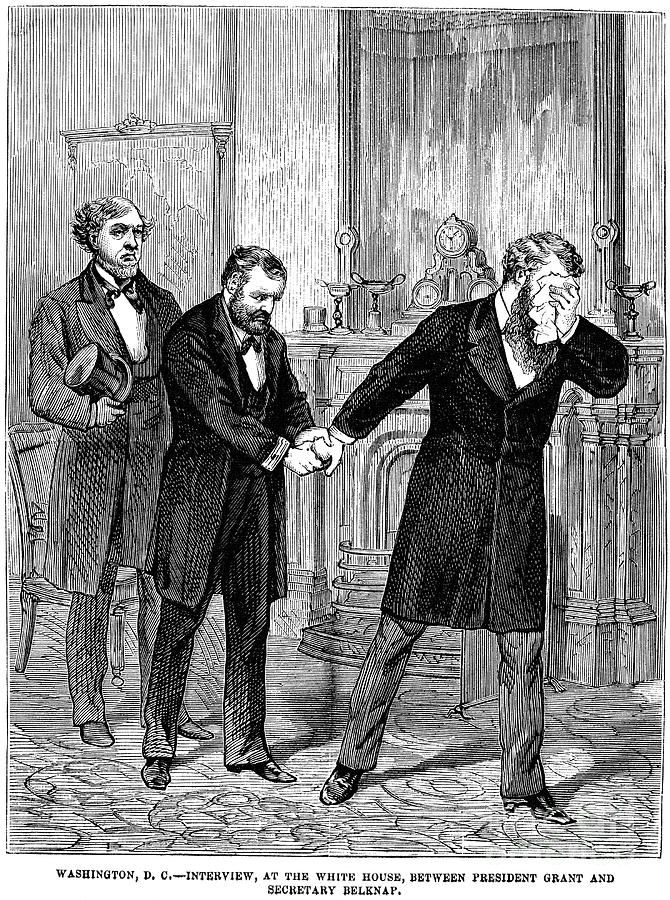Stand up for the facts!
Our only agenda is to publish the truth so you can be an informed participant in democracy.
We need your help.
I would like to contribute

Senate Majority Leader Chuck Schumer, D-N.Y., speaks during a news conference hours before senators were sworn in for President Donald Trump's second impeachment trial on Jan. 26, 2021. (AP)
If Your Time is short
• The Senate trial of William W. Belknap in 1876 provides the clearest precedent for the chamber’s ability to try President Donald Trump despite his having left the White House.
• The fact that the Senate held a trial of Belknap even though he had resigned suggests to many scholars that the Senate could use that power against Trump.
• At the same time, the Senate did not reach the two-thirds majority needed to convict Belknap, suggesting that the Senate’s action in 1876 fell well short of a broad consensus.
As the Senate approaches the start of former President Donald Trump’s second impeachment trial on Feb. 9, one name keeps popping up — a once-obscure secretary of war from the 1870s, William W. Belknap.
Belknap’s impeachment and trial offers the clearest precedent for holding a Senate trial for a political figure who is already out of office. That’s relevant today because Trump is also out of office, having been impeached by the House for a second time just days before his term ended.
Here are some questions and answers about the issues at stake.
The Belknap case took place in 1876, when he resigned as secretary of war just hours before the House impeached him on bribery charges. The Senate went ahead with the trial anyway but acquitted him on Aug. 1, 1876.
Belknap’s case was cited as a key precedent on the Senate floor recently by Majority Leader Chuck Schumer, D-N.Y., as he parried a motion by Sen. Rand Paul, R-Ky., to dispense with a trial.
Schumer said that Belknap "literally raced to the White House to tender his resignation before the House was set to vote on his impeachment. Not only did the House move forward with the impeachment, but the Senate convened a trial and voted as a chamber that Mr. Belknap could be tried ‘for acts done as secretary of war, notwithstanding his resignation of said office.’ The language is crystal clear, without any ambiguity."
Schumer also argued that the Senate should be able to hold a vote if it convicts Trump to bar him from holding future office. In the past, the Senate has used a simple majority vote to bar three convicted officials, all federal judges, from holding office.
"It makes no sense whatsoever that a president or an official could commit a heinous crime against our country and then defeat Congress’ impeachment powers … by simply resigning," Schumer said.
William Belknap, President Ulysses S. Grant's secretary of war, resigned in the face of impeachment in 1876, but was impeached anyway.
Scholars have argued over what the drafters of the Constitution intended on impeachment, and what the text of the Constitution says. The problem is that "the constitutional language is not specific either way," said John Fortier, a specialist on Congress at the American Enterprise Institute. In fact, in their floor speeches, both Schumer and Paul cited constitutional passages to support their views on whether a trial should be held.
There are precedents of Congress choosing not to pursue impeachment of an official who resigned first, most notably President Richard Nixon in 1974. However, the Belknap case is the only one that offers an essentially parallel precedent for what is happening today, scholars said.
"There are other precedents, but none so direct," said Brian Kalt, a law professor at Michigan State University, who wrote a 2001 paper on the subject.
In Belknap’s case, his defense team specifically sought to argue to the Senate that the case should be dismissed for lack of jurisdiction because he no longer held office, said Keith E. Whittington, a Princeton University political scientist. But that motion "was rejected by the Senate, which held that it had the constitutional authority to proceed to trial and verdict," Whittington said.
In at least one way, Kalt said, the argument for trying Trump may be stronger than the one for trying Belknap. That’s because Trump was impeached by the House while he was still in office, whereas Belknap was not.
Meanwhile, the decision by senators to pursue a trial against Belknap, while far from unanimous, carries weight because the Constitution "provides that the Senate has the ‘sole power’ to try impeachments," said James Robenalt, a lawyer with expertise in political crises. "The Senate agreed it had the authority to try an official who was no longer in office. It seems to me that a court would not second-guess that interpretation."
In the end, the Senate failed to reach the two-thirds threshold needed to convict Belknap, and "a number of senators" who voted against conviction said at the time their belief that the trial was inappropriate "was important" in their decision to acquit, Fortier said.
For critics of a second Trump trial in the Senate, it offers an alternate precedent.
The Belknap case shows that while "a majority viewed impeachment as extending beyond removal for the purposes of a trial," it also "shows considerable opposition to that proposition," wrote George Washington University law professor Jonathan Turley.
Scholars on both sides of the question acknowledge that the other side has credible support to muster for their case.
Even as he wrote a Washington Post op-ed in arguing that Trump couldn’t be tried once he left office, J. Michael Luttig, a former federal judge, added that impeachment cases like Belknap’s "provide some backing for the argument that Congress can conclude that it has the power under the Constitution to impeach a former president."
On the other side of the issue, Kalt, Whittington, and Robenalt acknowledged that their preferred perspective — in favor of the Senate being able to hold a trial for Trump — is not a "slam dunk."
That said, the three scholars agreed that the preponderance of research on this topic suggests a trial is permissible.
"The people who have studied this most closely, including those of us who had looked into this issue well before the current controversy, have tended to lean in favor of the validity of impeachment trials of former officials," Whittington said.
As for Belknap, he left government after his acquittal, lived a relatively quiet life as a lawyer, and died in 1890.
Our Sources
C-SPAN, remarks by Senate Majority Leader Chuck Schumer, Jan. 26, 2020
Jonathan Turley, "The Case Against Retroactive Impeachment Trials," Jan. 22, 2021
J. Michael Luttig, "Once Trump leaves office, the Senate can’t hold an impeachment trial," Jan. 12, 2021
Congressional Research Service, "The Impeachment Process in the Senate," Jan. 21, 2020
Congressional Research Service, "Resolutions to Censure the President: Procedure and History," Nov. 20, 2019
Brian Kalt, "The Constitutional Case for the Impeachability of Former Federal Officials: An Analysis of the Law, History, and Practice of Late Impeachment," 2001
PolitiFact, "The second Trump impeachment: Questions and answers," Jan. 11, 2021
Email interview with Stephen M. Griffin, Tulane University law professor, Jan. 26, 2021
Email interview with John Fortier, congressional specialist at the American Enterprise Institute, Jan. 26, 2021
Email interview with Brian Kalt, law professor at Michigan State University, Jan. 26, 2021
Email interview with James Robenalt, lawyer at the firm Thompson Hine, Jan. 26, 2021
Email interview with Keith E. Whittington, Princeton University political scientist, Jan. 26, 2021



































